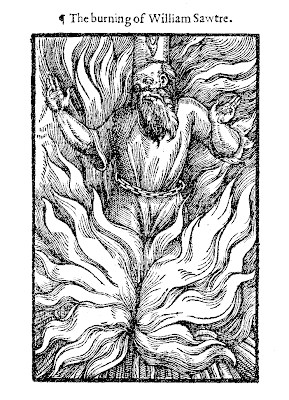Monday, October 01, 2012
Executed Over Translating the Bible
Pictured at right: The execution of William Sawtry, "the first Wycliffite martyr to be burned at the stake after the passage of the statute De heretico comburendo", as depicted in John Foxe's Acts and Monuments.
In "civilized" Europe, not so long ago--relative to the broad scope of human history--professing Christians killed other professing Christians over translating the Bible into the vernacular or common language of the people and related doctrinal matters. You see in 1401, inspired by the proliferation of so-called Wycliffe Bibles, the English Parliament passed an act known as De heretico comburendo, Latin for "Regarding the heretic who is to be burnt".
Among other things, it made it unlawful to "make or write any book contrary to the catholic faith or determination of the Holy Church". The "determination" of "the Holy Church" being that, as far as the laity was concerned, the Bible should be in Latin only because "... Scripture was given only to, and could only be understood by, either the extremely learned. 'the doctors', or the clergy". So writes David Daniell in The Bible in English (Yale UP, 2003; p. 68).
As Daniell notes: "Heresy was soon to include reading not just owning even a scrap of Scripture not in Latin" (p. 68). Daniell, citing Nicholas Watson, further writes: "the capacity of the English language was rejected; the lower classes were refused [English] texts; limitations were imposed on what it was 'necessary' to know; and the role of clergy as guardians of truth and controllers of its communications was emphasised" (p. 110).
De heretico comburendo was enforced well into the 1500s and, "between 1553 and 1558 ... about 300 men and women were burned alive" (p. 263) under the law. Perhaps the best known victim of the vernacular-Bible-as-heresy principle was English Bible translator William Tyndale, who was executed in October 1536 in Belgium.
Labels: Christianity, religion, thoughtcrime, violence





